Deborah J. Ross's Blog, page 104
October 19, 2016
The "Ennara" Books: Middle Grade Fantasy Strikes the Perfect Tone
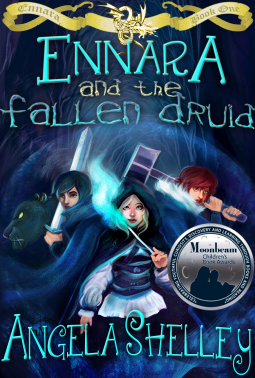 Ennara and the Fallen Druid (Ennara, #1) by Angela Shelley, Patchwork Press, October 2014.
Ennara and the Fallen Druid (Ennara, #1) by Angela Shelley, Patchwork Press, October 2014.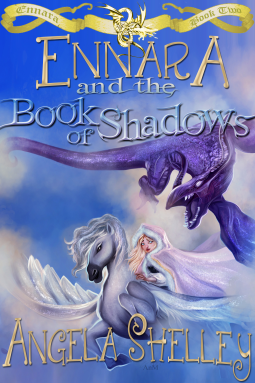 Ennara and the Book of Shadows (Ennara, #2) by Angela Shelley, Patchwork Press, October 2014
Ennara and the Book of Shadows (Ennara, #2) by Angela Shelley, Patchwork Press, October 2014Middle grade fiction stands apart from its younger and older (Young Adult) cousins in ways that go beyond the simple division by ages. Kids this age are just beginning to spread their wings, assert their independence and individuality, and test their limits. Friends help them define themselves and try out new behaviors and identities, although not always in ways their parents approve. At the same time, they’re not ready to plunge into the full-blown angst, sex, blood, and darkness (although certainly rock/n/roll) of stories for older readers. They often prefer adults to hang around somewhere, just not too close by; they tread the line between wanting to go off entirely on their own and needing someone stronger and wiser to lend a hand when they get in over their heads. In other words, they’re highly capable children. Some will happily devour literature for teens and adults, but others want the same adventurousness, but featuring kids closer to their own age.
With this perspective in mind, I embarked upon a series of adventures with young Ennara and her friends. The setting included many familiar elements: low-technology villages, magic, prophecies, pirates, “shadowspawn,” and druids. In an adult fantasy, these might feel generic and derivative, a hodge-podge of time-worn tropes, but in Angela Shelley’s hands, they evoke a sense of familiarity. Pre-teen readers aren’t after a startlingly original world with sophisticated culture and so forth; they want a good story with characters they can relate to. So even details that caused me-the-adult to roll my eyes were strangely congruent and certainly didn’t cause me to stop reading (although I admit, finding a professor in a plaid blazer in the middle of a fantasy tale gave me a giggle). I don’t think the intended readers will notice, for instance, that druids have been done to death in adult fantasy; instead, they’ll recognize the name, just exotic enough to be not-here-and-now, but not so alien as to require chapters of backstory and explanation.
So the above-mentioned shadowspawn appear in Ennara’s village, thereby initiating a quest for our young heroine. Ennara is magically gifted, of course, although not educated in its use. She has a mentor, a wise old magician (who incidentally is in love with her potion-making aunt, which made me smile), a family, who remain behind but send their love and support, and a best friend. As the adventure unfolds, she picks up a new friend (and a huge marine cat named Smoos who loves to swim), loses the mentor partway through (although he’s still alive and they wrap him up to bring him along with them). Ennara’s gifts and self-confidence grow as she learns from her adventures, so there are no sudden bursts of power but a careful, step-wise mastery and growing self-knowledge, which is, after all, what the pre-teen years are about.
The second book begins with Ennara enrolled in a school of magic, the Druidic Academy. Again, that’s something we’re all familiar with from the Harry Potter books, and others. The initiating incident is both hilarious and innovative. One of Ennara’s classmates has substituted a dead flower for the wilted one she is supposed to revive, thereby giving rise to a plague of zombie flowers. Zombie flowers are quickly followed by a turtle dragon, and the friends are off on a new adventure. The one wrong note here, in my opinion, was an attempt to paint this world as the aftermath of the fall of our current civilization. While it’s possible to combine fantasy and what is essentially science fiction, in this case it was both unnecessary and it led to too many unanswered questions.
One of the strengths most evident in the Book of Shadows was the choice between light and dark magic. So often in books for older readers and adults, when anyone tells a character to beware the dark side, that’s exactly where that character goes, sometimes succumbing to its temptation. Ennara has a natural affinity for dark magic, but she listens carefully when warned to choose the light. And that’s exactly what she does. It isn’t easy, but even as she struggles to find a way, she never wavers. I found a refreshing innocence in Ennara’s determination, one that, while it might not appeal as strongly to cynical older teens, offers validation and comfort to younger readers.
Lastly, both books emphasize the value of loyal, accepting friends (even the marine cat). Ennara and her friends are team players, often fighting together, each with his or her special strength, their whole being greater than their parts. She cannot master every challenge and overcome every obstacle on her own, but together they can. This emphasis is hardly unique to middle grade fiction, which only reinforces how we all need a community. The message here is that it isn’t necessary to be the best in everything in order to be a hero. Your friends have your back.
The end left open the possibility for a third adventure for Ennara and her friends. I hope we get to see what happens next!

Published on October 19, 2016 01:00
October 17, 2016
Short Book Review: Twilight with Angels and Demons
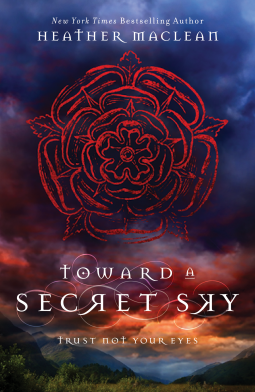 Toward a Secret Skyby Heather Maclean (Blink, April 2017) is a YA novel of the “Twilight with Angels and Demons” sort. Our teen orphan heroine finds herself shipped off to grandparents in Scotland where she explores scenery, makes friends, and encounters the devastatingly gorgeous angel assigned the guard her.
Toward a Secret Skyby Heather Maclean (Blink, April 2017) is a YA novel of the “Twilight with Angels and Demons” sort. Our teen orphan heroine finds herself shipped off to grandparents in Scotland where she explores scenery, makes friends, and encounters the devastatingly gorgeous angel assigned the guard her.Even though she is told in no uncertain terms of the dire consequences of human-angel love affairs, she plunges into one obsessive daydream after another about him, refuses to heed his warnings to leave him alone, and in general behaves like an infatuated adolescent incapable of making rational decisions. To be sure, she has personality and strengths, not the least of which are keen mental abilities and a generous heart, and the story moves along nicely, with enough twists to keep the reader engaged. Logic bobbles (like why would a handsome, rich incubus need a date-rape drug when looks and money alone would get him as much sex as he wants?) flawed an otherwise enjoyable flow of prose, and the “the war [with demons] is just beginning” epilog felt tacked-on.
These shortcomings may pale in comparison to the overall enjoyability of the story, particularly for a young adult reader but a more critical reader may find them annoying.

Published on October 17, 2016 01:00
October 14, 2016
Supporting a New Writer 6: Connecting
Effie Seiberg: Depending on what kind of writing you're doing, and where you are geographically,
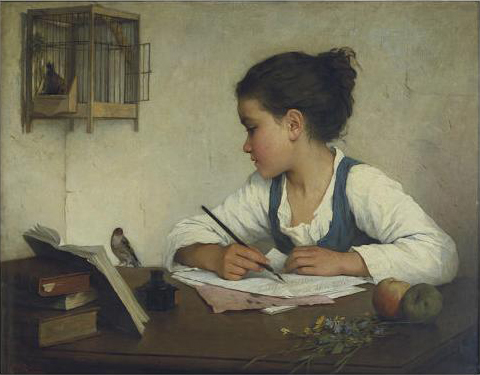 there are a number of ways to find kindred spirits.
there are a number of ways to find kindred spirits.
Conventions: Whether conventions or conferences, I found these to be an invaluable resource for meeting people. (In fact, that's how I met Deborah!) At one panel about plotting techniques, one person from the audience asked how one might go about finding a critique group. One of the panelists said to look around the audience - the people going to the same panels you are probably have the same needs. After the panel was over I got together with two other people from the audience and formed my first crit group. That was three years ago, and I'm still swapping stories with one of them.
Classes and workshops: If there are classes in your area, that's another way to get an insta-community. You can also apply to a variety of workshops that are available. Or, many writers offer online classes with a video component, either through YouTube or Google Hangouts. A digital class community still counts!
Industry groups: If you're publishing science fiction, fantasy, or horror, trade groups like SFWA (the Science Fiction and Fantasy Writers of America, sort of the national guild, with online forums for discussion) and community groups like Codex (an online community full of support and advice) are great ways to meet people. If you're interested in pure horror, there's also HWA (the Horror Writers of America.) For all, you need to qualify to join.
If you're publishing romance, the industry group RWA (Romance Writers of America) is massive and allows anyone to join, and has local events in many places.
Other sub-genres have their own groups. Just look online!
Local meet-ups: Meetup.com is a great way to find local writing meet-ups. My area has a number of "Shut up and Write" meet-ups, and guess what happens there.
Online critique forums: You can trade work with other writers on groups like Critique Circle, Critters, and more.
I hope one or more of these options work for you! I find my writing support groups (yes, I have several!) to be incredibly helpful, both in improving my writing and in improving my state of mind. Good luck, and you can do it!
Effie Seiberg is a fantasy and science fiction writer. Her stories can be found in the "Women Destroy Science Fiction!" special edition of Lightspeed Magazine, Galaxy's Edge, Analog, Fireside Fiction, and PodCastle, amongst others. She is a graduate of Taos Toolbox 2013, a member of SFWA and Codex, and a reader at Tor.com.
Barb Caffrey: Here's one more additional resource that helped me, back in the day...it's Forward Motion Writer's Group (or fmwriters.com, I think -- might be .org). Lazette Gifford runs the site now, but it was started by Holly Lisle. It's a group by writers, for writers, and they talk about all sorts of writerly-related things, including things that get in the way of writing.
Barb Caffrey has written three novels, An Elfy On The Loose (2014), A Little Elfy in Big Trouble (2015), and Changing Faces (forthcoming), and is the co-writer of the Adventures of Joey Maverickseries (with late husband Michael B. Caffrey) Previous stories and poems have appeared in Stars Of Darkover, First Contact Café, How Beer Saved The World, Bearing North, and Bedlam's Edge (with Michael B. Caffrey).

 there are a number of ways to find kindred spirits.
there are a number of ways to find kindred spirits.Conventions: Whether conventions or conferences, I found these to be an invaluable resource for meeting people. (In fact, that's how I met Deborah!) At one panel about plotting techniques, one person from the audience asked how one might go about finding a critique group. One of the panelists said to look around the audience - the people going to the same panels you are probably have the same needs. After the panel was over I got together with two other people from the audience and formed my first crit group. That was three years ago, and I'm still swapping stories with one of them.
Classes and workshops: If there are classes in your area, that's another way to get an insta-community. You can also apply to a variety of workshops that are available. Or, many writers offer online classes with a video component, either through YouTube or Google Hangouts. A digital class community still counts!
Industry groups: If you're publishing science fiction, fantasy, or horror, trade groups like SFWA (the Science Fiction and Fantasy Writers of America, sort of the national guild, with online forums for discussion) and community groups like Codex (an online community full of support and advice) are great ways to meet people. If you're interested in pure horror, there's also HWA (the Horror Writers of America.) For all, you need to qualify to join.
If you're publishing romance, the industry group RWA (Romance Writers of America) is massive and allows anyone to join, and has local events in many places.
Other sub-genres have their own groups. Just look online!
Local meet-ups: Meetup.com is a great way to find local writing meet-ups. My area has a number of "Shut up and Write" meet-ups, and guess what happens there.
Online critique forums: You can trade work with other writers on groups like Critique Circle, Critters, and more.
I hope one or more of these options work for you! I find my writing support groups (yes, I have several!) to be incredibly helpful, both in improving my writing and in improving my state of mind. Good luck, and you can do it!
Effie Seiberg is a fantasy and science fiction writer. Her stories can be found in the "Women Destroy Science Fiction!" special edition of Lightspeed Magazine, Galaxy's Edge, Analog, Fireside Fiction, and PodCastle, amongst others. She is a graduate of Taos Toolbox 2013, a member of SFWA and Codex, and a reader at Tor.com.
Barb Caffrey: Here's one more additional resource that helped me, back in the day...it's Forward Motion Writer's Group (or fmwriters.com, I think -- might be .org). Lazette Gifford runs the site now, but it was started by Holly Lisle. It's a group by writers, for writers, and they talk about all sorts of writerly-related things, including things that get in the way of writing.
Barb Caffrey has written three novels, An Elfy On The Loose (2014), A Little Elfy in Big Trouble (2015), and Changing Faces (forthcoming), and is the co-writer of the Adventures of Joey Maverickseries (with late husband Michael B. Caffrey) Previous stories and poems have appeared in Stars Of Darkover, First Contact Café, How Beer Saved The World, Bearing North, and Bedlam's Edge (with Michael B. Caffrey).

Published on October 14, 2016 01:00
October 13, 2016
Short Book Review: Motorcycles, Mayhem, and Psychiatry
Medea’s Curse, by Anne Buist (Legend Press, October 2016) This psychiatric thriller immediately
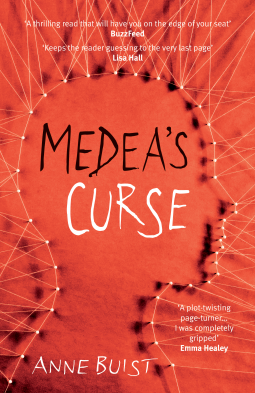 reminded me of the work of Tess Gerritsen and the “Alex Delaware” novels of Jonathan Kellerman. Yet Buist’s heroine is very much her own person, an Australian motorcycle-riding forensic psychiatrist who specializes in women who have killed their own children.
reminded me of the work of Tess Gerritsen and the “Alex Delaware” novels of Jonathan Kellerman. Yet Buist’s heroine is very much her own person, an Australian motorcycle-riding forensic psychiatrist who specializes in women who have killed their own children.
With dramatic tension that never lets up, the story follows Natalie King through cases past and present, with danger never far behind. But who is stalking her? The attentive husband of an inmate who may or may not have multiple personality disorder? The boyfriend of one of her clients, now in prison – and whose present wife has just been accused of murdering their baby? The charming attorney with whom she’s shared a fling? With the lives of other children at stake, Natalie races to solve the mystery before it’s too late.
One of the things I liked best about the book was the understanding that no professional can deal with material this upsetting without a support system of her own. Plus it’s really cool to have a strong woman hero who is also really smart!

 reminded me of the work of Tess Gerritsen and the “Alex Delaware” novels of Jonathan Kellerman. Yet Buist’s heroine is very much her own person, an Australian motorcycle-riding forensic psychiatrist who specializes in women who have killed their own children.
reminded me of the work of Tess Gerritsen and the “Alex Delaware” novels of Jonathan Kellerman. Yet Buist’s heroine is very much her own person, an Australian motorcycle-riding forensic psychiatrist who specializes in women who have killed their own children.With dramatic tension that never lets up, the story follows Natalie King through cases past and present, with danger never far behind. But who is stalking her? The attentive husband of an inmate who may or may not have multiple personality disorder? The boyfriend of one of her clients, now in prison – and whose present wife has just been accused of murdering their baby? The charming attorney with whom she’s shared a fling? With the lives of other children at stake, Natalie races to solve the mystery before it’s too late.
One of the things I liked best about the book was the understanding that no professional can deal with material this upsetting without a support system of her own. Plus it’s really cool to have a strong woman hero who is also really smart!
From the book: Anne Buist is the Chair of Women’s Mental health at the University of Melbourne and has over 25 years clinical and research experience in perinatal psychiatry, working on cases of abuse, kidnapping, infanticide, and murder.

Published on October 13, 2016 01:00
October 12, 2016
Short Book Reviews: Immortality and That Special Occult Book
Two recurring motifs in fantasy literature, both historical and contemporary, are the conquest of death and the book of secrets. The search for immortality — and its advantages and drawbacks — ranges from a fascination with immortal creatures (vampires, gods, Tolkien’s elves) to The Fountain of Youth and the cure for all bodily ills. The book or scroll or other text takes as many forms, from ancient books of magic, grimoires, H. P. Lovecraft’s Necromonicon, and other sorts of occult texts.
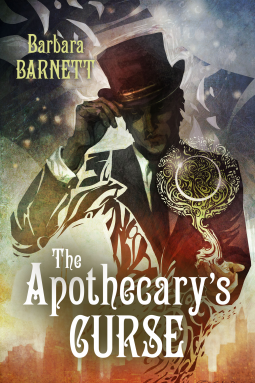 The Apothecary’s Curse by Barbara Bennett (Pyr, October 2016) reads a bit like a Dan Brown thriller. Immortality (or rather, the ability to heal from almost any disease or injury) has been achieved, thanks to an ancient text, a compendium of remedies based on various herbs and chemicals, derived from knowledge millennia before its time and rooted in a Celtic-like myth. The ingredients and procedures must be followed with scientific accuracy, and any deviation is likely to cause disastrous results. In this story, the two viewpoint characters — one a 17th Century apothecary, the other a physician from almost two centuries later — have achieved immortality and found it to be a curse. The book, however, has been lost, along with any hope of restoring them to normal human lives. In every era, they must deal with those who seek this knowledge for their own nefarious purposes.
The Apothecary’s Curse by Barbara Bennett (Pyr, October 2016) reads a bit like a Dan Brown thriller. Immortality (or rather, the ability to heal from almost any disease or injury) has been achieved, thanks to an ancient text, a compendium of remedies based on various herbs and chemicals, derived from knowledge millennia before its time and rooted in a Celtic-like myth. The ingredients and procedures must be followed with scientific accuracy, and any deviation is likely to cause disastrous results. In this story, the two viewpoint characters — one a 17th Century apothecary, the other a physician from almost two centuries later — have achieved immortality and found it to be a curse. The book, however, has been lost, along with any hope of restoring them to normal human lives. In every era, they must deal with those who seek this knowledge for their own nefarious purposes.
I loved the premise that an ancient text, written is such a way that only an adept can unravel its secrets, holds a treasure trove of scientific lore equal to what contemporary medicine possesses. The characters appealed to me, especially the apothecary struggling with PTSD after being tortured for decades in a madhouse. The one misstep came near the end with a sudden detour into conventional fantasy and divine intervention that was not only unnecessary but for me detracted from the “ancient science” theme. Still, the book was an enjoyable read, a nice combination of two time-honored themes with a medical thriller twist.
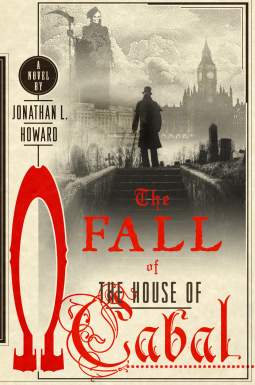 The Fall of the House of Cabal by Jonathan L. Howard (St. Martin’s Press, Thomas Dunne Books, Sept. 2016) presented a delightful read from the first page, with its quirky humor and even quirkier characters. This is not the first adventure of Johannes Cabal, necromancer and social misfit, and his debonair vampire brother, Horst, but it’s a dandy place to jump in. Johannes and Horst are off on a quest across virtual dimensions, one that involves both immortality that That Special Occult Book. On their way, they're accompanied by assorted comrades — living, dead, and demonic. My favorite was the latter, a gigantic half-woman, half-spider who wears an angora sweater and is as enthusiastic about sex as she is about murder. When introduced to Johannes's (human) woman detective companion, someone he cannot bring himself to admit his feelings for, the first thing our spider-demon asks is, "Is she your lover?" No, he sputters, of course not. "But here is Horst, my brother." "Oh," says the spider. "Is he your lover?" You've got to love a creature who thinks that way.
The Fall of the House of Cabal by Jonathan L. Howard (St. Martin’s Press, Thomas Dunne Books, Sept. 2016) presented a delightful read from the first page, with its quirky humor and even quirkier characters. This is not the first adventure of Johannes Cabal, necromancer and social misfit, and his debonair vampire brother, Horst, but it’s a dandy place to jump in. Johannes and Horst are off on a quest across virtual dimensions, one that involves both immortality that That Special Occult Book. On their way, they're accompanied by assorted comrades — living, dead, and demonic. My favorite was the latter, a gigantic half-woman, half-spider who wears an angora sweater and is as enthusiastic about sex as she is about murder. When introduced to Johannes's (human) woman detective companion, someone he cannot bring himself to admit his feelings for, the first thing our spider-demon asks is, "Is she your lover?" No, he sputters, of course not. "But here is Horst, my brother." "Oh," says the spider. "Is he your lover?" You've got to love a creature who thinks that way.
The story is a witty, endlessly entertaining, fast-moving romp through Hell and London (via a few other places) that left me cheering and wanting more. I have no doubt that the House of Cabal shall rise again!
 The Apothecary’s Curse by Barbara Bennett (Pyr, October 2016) reads a bit like a Dan Brown thriller. Immortality (or rather, the ability to heal from almost any disease or injury) has been achieved, thanks to an ancient text, a compendium of remedies based on various herbs and chemicals, derived from knowledge millennia before its time and rooted in a Celtic-like myth. The ingredients and procedures must be followed with scientific accuracy, and any deviation is likely to cause disastrous results. In this story, the two viewpoint characters — one a 17th Century apothecary, the other a physician from almost two centuries later — have achieved immortality and found it to be a curse. The book, however, has been lost, along with any hope of restoring them to normal human lives. In every era, they must deal with those who seek this knowledge for their own nefarious purposes.
The Apothecary’s Curse by Barbara Bennett (Pyr, October 2016) reads a bit like a Dan Brown thriller. Immortality (or rather, the ability to heal from almost any disease or injury) has been achieved, thanks to an ancient text, a compendium of remedies based on various herbs and chemicals, derived from knowledge millennia before its time and rooted in a Celtic-like myth. The ingredients and procedures must be followed with scientific accuracy, and any deviation is likely to cause disastrous results. In this story, the two viewpoint characters — one a 17th Century apothecary, the other a physician from almost two centuries later — have achieved immortality and found it to be a curse. The book, however, has been lost, along with any hope of restoring them to normal human lives. In every era, they must deal with those who seek this knowledge for their own nefarious purposes. I loved the premise that an ancient text, written is such a way that only an adept can unravel its secrets, holds a treasure trove of scientific lore equal to what contemporary medicine possesses. The characters appealed to me, especially the apothecary struggling with PTSD after being tortured for decades in a madhouse. The one misstep came near the end with a sudden detour into conventional fantasy and divine intervention that was not only unnecessary but for me detracted from the “ancient science” theme. Still, the book was an enjoyable read, a nice combination of two time-honored themes with a medical thriller twist.
 The Fall of the House of Cabal by Jonathan L. Howard (St. Martin’s Press, Thomas Dunne Books, Sept. 2016) presented a delightful read from the first page, with its quirky humor and even quirkier characters. This is not the first adventure of Johannes Cabal, necromancer and social misfit, and his debonair vampire brother, Horst, but it’s a dandy place to jump in. Johannes and Horst are off on a quest across virtual dimensions, one that involves both immortality that That Special Occult Book. On their way, they're accompanied by assorted comrades — living, dead, and demonic. My favorite was the latter, a gigantic half-woman, half-spider who wears an angora sweater and is as enthusiastic about sex as she is about murder. When introduced to Johannes's (human) woman detective companion, someone he cannot bring himself to admit his feelings for, the first thing our spider-demon asks is, "Is she your lover?" No, he sputters, of course not. "But here is Horst, my brother." "Oh," says the spider. "Is he your lover?" You've got to love a creature who thinks that way.
The Fall of the House of Cabal by Jonathan L. Howard (St. Martin’s Press, Thomas Dunne Books, Sept. 2016) presented a delightful read from the first page, with its quirky humor and even quirkier characters. This is not the first adventure of Johannes Cabal, necromancer and social misfit, and his debonair vampire brother, Horst, but it’s a dandy place to jump in. Johannes and Horst are off on a quest across virtual dimensions, one that involves both immortality that That Special Occult Book. On their way, they're accompanied by assorted comrades — living, dead, and demonic. My favorite was the latter, a gigantic half-woman, half-spider who wears an angora sweater and is as enthusiastic about sex as she is about murder. When introduced to Johannes's (human) woman detective companion, someone he cannot bring himself to admit his feelings for, the first thing our spider-demon asks is, "Is she your lover?" No, he sputters, of course not. "But here is Horst, my brother." "Oh," says the spider. "Is he your lover?" You've got to love a creature who thinks that way.The story is a witty, endlessly entertaining, fast-moving romp through Hell and London (via a few other places) that left me cheering and wanting more. I have no doubt that the House of Cabal shall rise again!

Published on October 12, 2016 01:00
October 7, 2016
Con-Volution 2016 Report

Con-Volution is a medium sized (700 ish members) convention in the Bay Area. I first attended a couple of years ago and was pleased to be invited to return. This year’s theme was “Monsters,” so many of the panels and other events centered around Things That Go Bump in the Night, creepy-crawlies, and the like, a fitting greeting to October.
I arrived in time to attend part of “An Aviary of Beasties,” moderated by Juliette Wade and held in the parlor of a hotel suite, making it cozy and very difficult to find. Nevertheless, the small space was filled, and as I walked in, Juliette was discussing the difference between the wings of a bat and a pterodactyl. Panelists shared myths of flying creatures from many cultures. In wandered one of the residents-in-costume, wearing a marvelous kirin head, whose timing made a perfect introduction to tales about that creature.
My first panel was “Authors: Going to that Dark Place,” with horror author Fred Wiehe, Margaret McGaffey Fisk, Loren Rhoads, and Guest of Honor Ann Bishop. We approached the relationship between authors and “that dark place” from two directions. One involved delving into our own nightmares and using them to fuel our stories, and the stories then become cathartic or therapeutic in lessening the hold those catastrophes have over our lives and (hopefully) those of our readers. I was reminded of Octavia Butler saying she took her worst night mares and put them down on paper. This is also what I did in a number of stories (“Rite of Vengeance,” “Beneath the Skin,” “Crooked Corn”) following the murder of my mother, and also used for my hero’s journey in The Seven Petaled Shield. Others take another approach, which is to start with the story and find the darkness within ourselves to give it depth and power. Ann Bishop observed that horror stories are like a journey through a spooky forest with various companions that may survive or not, but we have faith that someone will make it through. “There is no light without darkness,” Fred Wiehe pointed out. Does the dark keep us sane?
For “How Cthulu Became Cuddly,” I was joined by Artist Guest of Honor Lee Moyer, Laurel Anne Hill, and Jennifer Carson.
I attended a wonderful discussion on “Fear of the Other” with Juliette Wade, Lillian Csernica, Gregg Castro, Garrett Calcaterra, and Sumiko Saulson. Recently, much attention has been devoted to how to write respectfully and realistically about people who are different from you (race, religion, gender, ability, etc.), and this panel focused specifically on how we fear or don’t fear those “others.” It was particularly good to hear minority voices in the discussion.
Sunday morning (10 am) is not the most popular time to hold a panel, so I was pleasantly surprised to find a roomful of attendees for the topic I moderated on “Writing in Someone Else’s Universe.” The room was a “boardroom,” a big oval table with executive chairs around it. This limited the number of people in the circle, but was perfect once things got going. Co-panelists Valerie Estelle Frankel and Sarah Stegall helped get the discussion off to a lively start. We talked about the different ways you might end up creating stories in a world someone else devised. You might use a public domain world and characters (as many have done with Lovecraft’s mythos—a wonderful way of tying in to earlier panels—or Sherlock Holmes or the many Jane Austen mashups). You might be part of a senior/junior author collaboration, with the senior author creator supervising the work. Shared worlds like Wild Cards use a bible to ensure continuity. Parody and satire open possibilities for works still under copyright under the “fair usage” rules. Finally, there is fanfic and its cousins, media tie-ins and novelizations. Here is where the “audience” and “panelist” divisions broke down in a wonderful fashion. We all had different relationships to fanfic (from readers only to this-is-the-only-thing-I-write, to deep roots in media tie-ins to both original and derivative writing. In addition, Valerie Frankel has written a significant number of nonfiction treatises on various worlds. As moderator, I felt comfortable letting the conversation bounce around to whoever had interesting things to contribute, and as a result, enthusiasm soared, fueled by a shared love of our common fan subjects. There was not a smidgeon of “my favorite is better than yours” (Star Trek vs. Star Wars); instead, we all got to appreciate what we have loved and discover new worlds to explore. It was a wonderful way to end the convention, with such a strong reminder of how we all got here and gratitude to the creators of the worlds and characters that have enriched our lives.

Published on October 07, 2016 01:00
October 5, 2016
Darkover Anthology News
I just turned in the final copy for Masques of Darkover, which I edited. Dave Smeds, who did the covers for Stars of Darkover, Gifts of Darkover, and Realms of Darkover, is working on the cover art and design. It'll be released in May 2017. Table of Contents is below--it's such a treat!
Jane Bigelow, Duvin’s Grand Tour
Rosemary Edghill, Generations
Meg Mac Donald, Upon this Rock
Evey Brett, Only Men Dance
Shariann Lewitt, The Wind
Ty Nolan, Dark Comfort
Steven Harper, Sight Unseen
Robin Wayne Bailey, The Mountains of Light
Marella Sands, Bone of My Bone
Rebecca Fox, Where You’re Planted
Leslie Roy Carter and Margaret L. Carter, Believing
India Edghill, The Price of Stars
Here's Dave's cover for the last anthology:
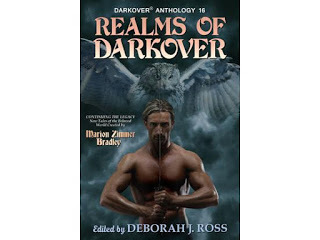

Jane Bigelow, Duvin’s Grand Tour
Rosemary Edghill, Generations
Meg Mac Donald, Upon this Rock
Evey Brett, Only Men Dance
Shariann Lewitt, The Wind
Ty Nolan, Dark Comfort
Steven Harper, Sight Unseen
Robin Wayne Bailey, The Mountains of Light
Marella Sands, Bone of My Bone
Rebecca Fox, Where You’re Planted
Leslie Roy Carter and Margaret L. Carter, Believing
India Edghill, The Price of Stars
Here's Dave's cover for the last anthology:


Published on October 05, 2016 01:00
October 3, 2016
[links] Hitch-hiker Barnacles and Other Nifty Things

Barnacles can tell a whale of a tale. Chemical clues inside barnacles that hitched rides on baleen whales millions of years ago could divulge ancient whale migration routes, new research suggests.

While Mercury has no plate tectonics in the terrestrial sense, crustal shrinking still qualifies as tectonic activity. It could even trigger Mercury-quakes.

New Ostrich-Mimic Dinosaur Species Identified “We histologically thin-sectioned the femur of Rativates evadens to analyze its growth and determined it was at least eight years old and nearly adult-sized at the time of death,” said Thomas Cullen, from the University of Toronto. .... “This suggests that there are at least two differently-sized, but closely-related dinosaur species that lived together on the ancient landscape, similar to what we see today in the closely related predators like foxes, coyotes and wolves,” said Dr. Claudia Schröder-Adams, of Carleton University.
On hearing voices: Psychics are much more likely to perceive the voices as positive or helpful and as experiences that can be controlled, according to a new study published Sept. 28 in the journal Schizophrenia Bulletin. "We have known for some time that people in the general population can have the experience of hearing voices—sometimes frequently—without the need for psychiatric intervention," said Albert Powers, a psychiatry fellow [at Yale] and lead author of the study.

Published on October 03, 2016 01:00
September 30, 2016
Supporting a New Writer 5: Hope Heals
Barb Caffrey: The main reason I restarted my writing despite a number of life challenges (including
 the loss of my husband Michael in 2004) is because I knew I needed to do it. Sometimes, writing can be stress relief; it allows you to step outside of your own head for a while, and do something else other than grieve -- do something else other than concentrate on all the problems you cannot solve.
the loss of my husband Michael in 2004) is because I knew I needed to do it. Sometimes, writing can be stress relief; it allows you to step outside of your own head for a while, and do something else other than grieve -- do something else other than concentrate on all the problems you cannot solve.
It allows you to do something positive. Something meaningful. Something that you can point to later, and ask yourself, "I did that?"
Granted, at the time, I didn't realize at all this was why I was trying so hard to write. I looked at it as an expression of creativity (which, of course, it is); I also saw it as my way to strike back against the darkness of entropy, and of course as a way to continue on with what my husband (also a writer) and I had done all our lives.
In short, writing allowed me to feel more like myself, rather than the person I had unwittingly become after my husband died so suddenly. I didn't like feeling like an open wound all the time; I wanted to heal.
Writing helped me heal.
From Wendy, for whom this blog series was created:
Dreams are possible....
Hope lives....
If you take action....
If you reach out with an earnest, heartfelt plea....
Good people will respond.
I do not take this creative journey alone. What a comfort this realization has been to me. I am encouraged and deeply grateful for the wonderful words of wisdom you have all shared with me.
I am writing again. Perhaps in fits and starts, but still putting words to electronic paper on a daily basis.
I am starting to believe in myself again, to see myself as a creative spirit with something to say.
My words matter. My words can entertain and enlighten. I have a voice. All of you have helped me find that voice again.
Thank you!

 the loss of my husband Michael in 2004) is because I knew I needed to do it. Sometimes, writing can be stress relief; it allows you to step outside of your own head for a while, and do something else other than grieve -- do something else other than concentrate on all the problems you cannot solve.
the loss of my husband Michael in 2004) is because I knew I needed to do it. Sometimes, writing can be stress relief; it allows you to step outside of your own head for a while, and do something else other than grieve -- do something else other than concentrate on all the problems you cannot solve.It allows you to do something positive. Something meaningful. Something that you can point to later, and ask yourself, "I did that?"
Granted, at the time, I didn't realize at all this was why I was trying so hard to write. I looked at it as an expression of creativity (which, of course, it is); I also saw it as my way to strike back against the darkness of entropy, and of course as a way to continue on with what my husband (also a writer) and I had done all our lives.
In short, writing allowed me to feel more like myself, rather than the person I had unwittingly become after my husband died so suddenly. I didn't like feeling like an open wound all the time; I wanted to heal.
Writing helped me heal.
Barb Caffrey has written three novels, An Elfy On The Loose(2014), A Little Elfy in Big Trouble (2015), and Changing Faces (forthcoming), and is the co-writer of the Adventures of Joey Maverick series (with late husband Michael B. Caffrey) Previous stories and poems have appeared in Stars Of Darkover, First Contact Café, How Beer Saved The World, Bearing North, And Bedlam's Edge (with Michael B. Caffrey).
From Wendy, for whom this blog series was created:
Dreams are possible....
Hope lives....
If you take action....
If you reach out with an earnest, heartfelt plea....
Good people will respond.
I do not take this creative journey alone. What a comfort this realization has been to me. I am encouraged and deeply grateful for the wonderful words of wisdom you have all shared with me.
I am writing again. Perhaps in fits and starts, but still putting words to electronic paper on a daily basis.
I am starting to believe in myself again, to see myself as a creative spirit with something to say.
My words matter. My words can entertain and enlighten. I have a voice. All of you have helped me find that voice again.
Thank you!

Published on September 30, 2016 01:00
September 23, 2016
Supporting A New Writer 4: Where We Go from Here
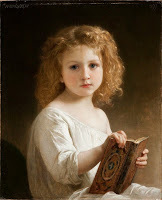 Each of us has a tale to tell about struggling to start or re-start a writing career. Here's the background on this project, and two responses below.
Each of us has a tale to tell about struggling to start or re-start a writing career. Here's the background on this project, and two responses below.Recently, I received this letter from a fan with whom I’d been corresponding. It spoke deeply to me, and rather than answer it alone, I asked some of my writer friends to join in a series of round table blogs on the issues raised. If you’ve been there, too, I hope you’ll follow along and offer your own wisdom.Doranna Durgin: I turned 56 on the very day my mom died just over a month ago. Meanwhile my writing has floundered for years—damaged by experiences in traditional publishing, never quite reaching fruition in the first place because I was in a financially vulnerable situation where I didn’t dare take risks. So I played nice. Too nice. Too much fear, too much doubt, and way too much negativity from outside sources. Familiar, right? I was trying to please everyone else before I pleased the muse, knowing it and hoping for some sort of break that would allow me to return to the muse. But instead of reaching a break, I hit a breaking point, and then…broke. Now I’m looking at the journey back and not certain how to take it.
I’ve been trying to reconnect with writing friends after a hiatus from the creative life. I’ve spent the past year or so taking care of my mom and working to pay the bills. Mom passed away in October. When your last parent passes away, it changes you in many ways. That foundation you always relied on — even as an adult — is gone for good. Whether you’re ready or not, you are truly on your own in the world and must somehow carry on without their nurturing presence. One of the most difficult aspects of my mother’s final days was the fact that she had so many regrets about life. She once had goals and dreams, but left them behind out of fear and a belief that these dreams were just not possible. I’m 54 years old. More than half of my life is over. Writing has been a dream/goal of mine since childhood. My mom was the only one who believed in me. I don’t want to leave this world regretting the fact that I never pursued this dream to the fullest. To be honest, my writing “career” never took off. I let fear, doubt and the negativity of others keep me from my dreams. I want so much to be brave, to take risks with my creative life. I truly wish for a group of fellow writers who are willing to give me the encouragement and support I need to write with my heart and soul, to grow as a writer and a human being. And I want to be a support for others as well. How do I get back into the writing life after leaving it on the back burner for so long?
So where do we all go from here?
In this case, I hope knowing you’re not alone is of some solace. Boy, you’re definitely not! And to some extent, I think we all wish we were bigger, bolder, better when it comes to our writing. To that same extent, I think having that desire is the critical part of writing. How do we do anything but stagnate without it? And just maybe the fact that we do have that ongoing need doesn’t mean we haven’t already been successful in many ways. Don’t discount those successes!
More practically speaking, I’m finding that I need to give myself space while at the same time setting reachable goals. For me, that means noodling on development in the background while working on production stuff and writing-related stuff in the foreground. For you, those first steps might include finding community online and in person, but I have some hesitation about focusing on these as a starting place. Writing comes from within, not without—and in my experience, outside influence is often about diluting, not enhancing, those pieces from within.
To that point, I’ve found a good book discussion group comprised of savvy readers and other writers to be an excellent place to practice critical thinking and to see how different writing is absorbed by different people…well, differently. I see it as a way to immerse in the thought process without subjecting the muse to the push and pull of others’ thinking.
I think one key, as we seek growth, is to recognize the successes we have in fact had, and then to keep our specific goals in mind while making decisions about the future—which means taking the time to truly understand our goals in the first place. So are the support groups and community part of the goal, or a way to reach the goal? And what other ways can you reach the specific goal?
Either way, good luck—hope to see you there on the other side!
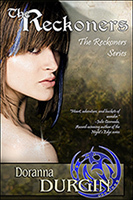 Doranna Durgin is an award-winning (Compton Crook--best first SF/F/H of the year) whose quirky spirit has led to an extensive and eclectic publishing journey across genres, across publishers, and across publishing lines. Beyond that, she hangs around outside her Southwest mountain home with horse and highly accomplished competition dogs. She doesn't believe in mastering the beast within, but in channeling its power. For good or bad has yet to be decided...
Doranna Durgin is an award-winning (Compton Crook--best first SF/F/H of the year) whose quirky spirit has led to an extensive and eclectic publishing journey across genres, across publishers, and across publishing lines. Beyond that, she hangs around outside her Southwest mountain home with horse and highly accomplished competition dogs. She doesn't believe in mastering the beast within, but in channeling its power. For good or bad has yet to be decided...Meg Mac Donald: On Starting Over:Just write.
I know, I know. That’s obvious. I realize that it may be oversimplifying things, but it is true that the only way to begin again is to (simply) start doing it. Anything. Write that story idea, or outline—or even that one scene—that has been playing in your mind for years. You know, the one about That Character when That Thing happened? Yeah. That one. Jot it down. Follow it as it begins to grow—give yourself permission to change it. Keep writing. If you write something, you have something to edit—or rewrite—later. Worst case scenario? You line the cat box with it and start something else. Put aside any notion about it being perfect, or publishable, or even making the remote bit of sense. It doesn’t have to. What it has to do is give you something to work with. Most of writing is rewriting and editing anyway. Give yourself permission to make a literary mess if that’s what it takes to break the cycle of doubt that is keeping you from writing at all.
Write whatever you want and don’t feel guilty. Write Firefly fan fiction. Write a story about your favorite super hero. What a vampire romance (if you have to, but remember, they are NOT sparkly)!
Need community? The internet is a wonderful (and terrible) place. Go forth, but carry an umbrella (and maybe some pepper spray). Google. Or take a Safari. Or play DuckDuckGo and look for forums, websites, blogs, and groups, and people on Twitter who share your interests. There are writers everywhere—and many of them feel the same way you do. You don’t need an army, you don’t need people to fawn over you or heap empty praises on your plate. You just need a few honest people who you can trade thoughts with, encourage, learn from—or assist.
It is amazing how much we grow when first we assist others to plant their own seeds.
Have fun. Enjoy the process. Give yourself a chance to develop your talent and try not to be in a hurry. Did I mention give yourself permission to change things when you resurrect old stories? Yeah. Do that. You’re older now. Wiser. Well, older. Your perception has changed. Remember: words are not the story. The story is the story. Use new words to tell the story you always wanted to tell. Get feedback. Be humble. Be brave. Take chances and send that story to Analog. What is the worst that can happen? They didn’t like it? Pft. Whatever. Rejection is an invitation to submit elsewhere. It isn’t a dead end. It is an arrow. Try another route. Been there before, on the verge of “breaking out” and never quite got there? We should form a support group.
I got a very good piece of advice from a friend I met online who later became a friend “in real life.” He told me this: look back, but don’t stare. At first, I didn’t like hearing that because I couldn’t help but look back and dwell on too many “almosts” that left me frustrated and feeling like a failure. Novels that were held by publishers for a year, then passed on. Being the 21st book out of 20. Being in the top group… and then not getting the contact. Having imprints go out of business on the eve of what should have been my break out sale! Then life threw curve balls that hit me square in the face. It wasn’t fair! But he was right. Yesterday is gone. What didn’t happen when I was a young writer didn’t happen, for whatever reason. That doesn’t mean it will never happen. Not unless I give up. Not unless you give up. Don’t. Give. Up.
Just write.(p.s. Thanks for the tip, brother Al)
After a number of years away from writing, Meg Mac Donald set pen to page again in 2011. Delightful chaos ensued. She shares her home in Michigan with her husband, children, a Norwegian Elkhound and a clowder of cats (yes, it actually is bigger on the inside). She would like to own horses again, sell a novel (how about a series? Any takers?) and has, sadly, never been to the Moon. Meg's sold stories to two previous Darkover anthologies (when she was very young but no less silly). You can follow her on Twitter @kyrrimar, but she doesn't really go anywhere. Her author page on Facebook is rubbish.
Effie Seiberg suggests “Another Word: On Being a Late Bloomer,” by Kelly Robson.

Published on September 23, 2016 01:00



